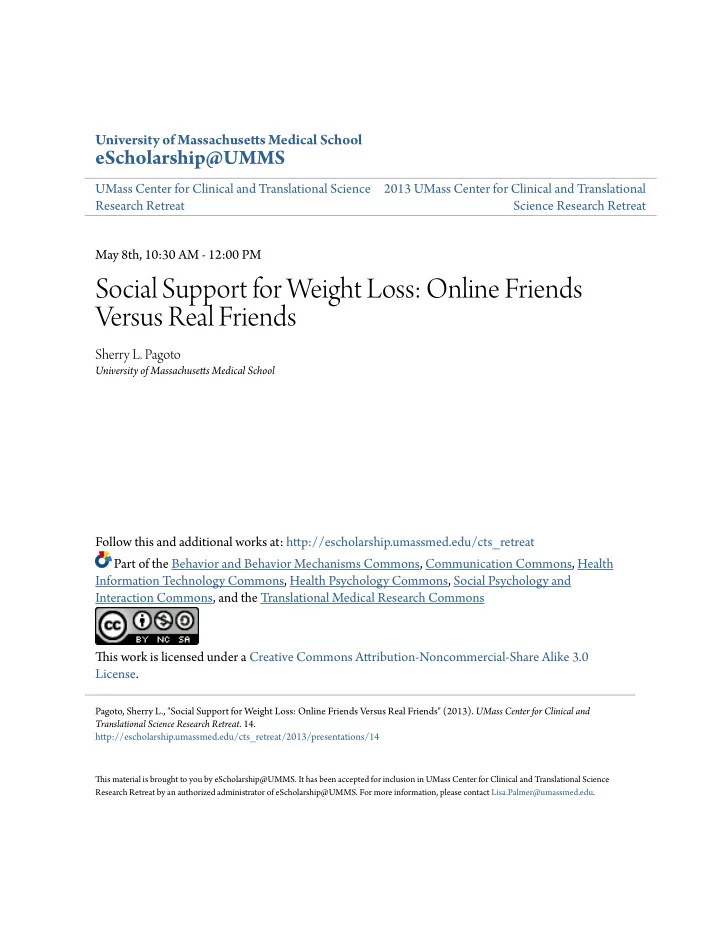

University of Massachusetus Medical School eScholarship@UMMS UMass Center for Clinical and Translational Science 2013 UMass Center for Clinical and Translational Research Retreat Science Research Retreat May 8th, 10:30 AM - 12:00 PM Social Support for Weight Loss: Online Friends Versus Real Friends Sherry L. Pagoto University of Massachusetus Medical School Follow this and additional works at: htup://escholarship.umassmed.edu/cts_retreat Part of the Behavior and Behavior Mechanisms Commons, Communication Commons, Health Information Technology Commons, Health Psychology Commons, Social Psychology and Interaction Commons, and the Translational Medical Research Commons Tiis work is licensed under a Creative Commons Aturibution-Noncommercial-Share Alike 3.0 License. Pagoto, Sherry L., "Social Support for Weight Loss: Online Friends Versus Real Friends" (2013). UMass Center for Clinical and Translational Science Research Retreat . 14. htup://escholarship.umassmed.edu/cts_retreat/2013/presentations/14 Tiis material is brought to you by eScholarship@UMMS. It has been accepted for inclusion in UMass Center for Clinical and Translational Science Research Retreat by an authorized administrator of eScholarship@UMMS. For more information, please contact Lisa.Palmer@umassmed.edu.
Sherry Pagoto, PhD Associate Professor of Medicine University of Massachusetts Medical School
Collabo aborat ators Kristin Schneider, PhD Effie Olendzki Martinus Evans
So Socia ial c conta tagion Obesity is “socially contagious” such that people are significantly more likely to be obese when they have an obese spouse and/or friends (Christakis and Fowler, 2007) Health habits are also shared in social circles Good news : If you adopt healthy behaviors, your family and friends may be more inclined to. Challenge: To get healthier, you’re gonna need to find some healthy friends.
“Peer r to p o peer h r healt lthcare” 34% of internet users have read about someone else’s experience with a health condition on the internet (Pew Internet Survey 2012) 25% of internet users with a chronic health condition have sought out others with that condition on the internet (Pew Internet Survey 2012)
Organic o onli line so social n l network f for weig eight loss o on n Twitt itter? Observation: There is a subculture of Twitter users who use it to talk about their weight loss journey. Study: How much positive and negative social influence about weight loss do people get from Twitter vs Facebook vs in-person friends, vs family?
Metho thods PI tweeted the survey 33 times over 4 weeks to get 90 complete responses for 2.72 surveys/tweet Tweet: “Do you tweet about your weight loss journey? Complete a brief survey!” Survey evaluated: 4 areas of positive social influence (comfort, helpful, informative, supportive) 2 areas of negative social influence (embarrassment, judgmental)
Partici cipant pants 90 surveys completed 79 participants had both Twitter and Facebook accounts 82% female, mean age = 35 (range 21- 57) Mean weight lost in current weight loss effort = 35 lbs, sd=36 (range 0-193 lbs)
Twitter Facebook p value Account duration .11 < 1 year 25.3% 1% 1-3 years 55.7% 17% 3+ years 19% 81% Log-in frequency .60 Several times/day 68% 57% Daily 23% 25% Less than daily 9% 17% Number of 437 (533) 474 (621) .73 friends/follows % of friends/followers 12% (19%) 82% (26%) .00 originated from an offline relationship
It Items ms I feel comfortable talking about weight loss, diet, and exercise with _____. In general, I find ____to be very helpful to me as I try to lose weight. I get support from ____about my weight. I get useful information from ____about weight loss, diet, and/or exercise. I have felt embarrassed about my weight when it comes to ____. ____tend to be judgmental about my weight.
So Socia ial Su Support How Helpful Are They * Comfort Talking About Weight To Your Weight Loss Effort 5 * 5 4 4 * 3 3 2 2 1 1 0 0 Twitter Facebook Family Friends Twitter Facebook Family Friends How Supportive to Get Information Your Weight Loss Effort 5 * 5 * 4 4 3 3 2 2 1 1 0 0 Twitter Facebook Family Friends Twitter Facebook Family Friends
Nega gative i influ luence 5 5 Feel Embarrassed About How Judgmental Weight 4 4 3 3 * 2 2 * 1 1 0 0 Twitter Facebook Family Friends Twitter Facebook Family Friends
What Do You Like Most? Twitter (n=103 responses) Facebook (n=28 responses) Sharing information 31% Support/encouragement 32% Support and encouragement 21% Information sharing 18% Common interest/community 17% Find in person friends with weight struggles 18% Motivation/inspiration 13% Pic sharing 14% Anonymity 10% Forming a private group 11% Lack of judgment 6% Way to drive people to Twitter 4% Conciseness of tweets 1% Lack of judgment relative to face-to-face interactions 3%
What Do You Like Least? Twitter (n=36 responses) Facebook (n=34 responses) Social comparison 19% Friends don’t care/think I’m bragging 26% Too much info 19% Don’t want friends to know 23% Lack of personal connection/don’t live Misinformation/bad advice 20% close to people I follow 17% Inconsistent response from followers Judgmental 20% 14% Ads/spam 11% Social comparison 1% 140 character limit 8% Cliques 6% Misinformation 3% At first hard to find people to follow 3%
Disc Discussio ion p poin ints ts Twitter is a source of positive social support for weight loss (more so than Facebook) Why? More likely source of encouragement, community and information than Facebook Anonymity may circumvent stigma/shame, disinhibits discomfort about talking freely Social network is hand-crafted, negative forces are easy to eliminate
Limitat atio ions ns Selection bias –recruiting from Twitter may have selected folks who are more positive about Twitter than Facebook No social support measure has been developed specifically for online social behavior
Future R Research We need theoretical models of online social interaction Can social media-naïve people be entered into these networks and benefit? What are the characteristics of people who are drawn to online social networks?
Find us on on T Twi witter: r: @DrSherryPagoto @DrKrisSchneider @EffieChung @300lbsandrunnin
Recommend
More recommend